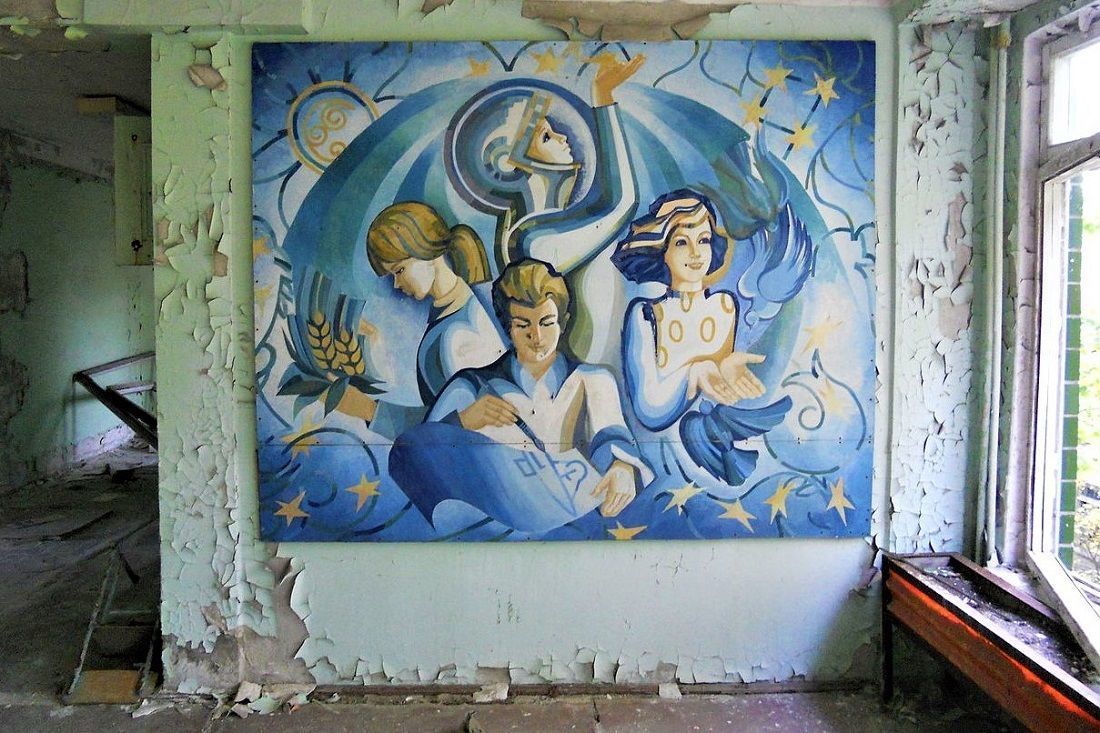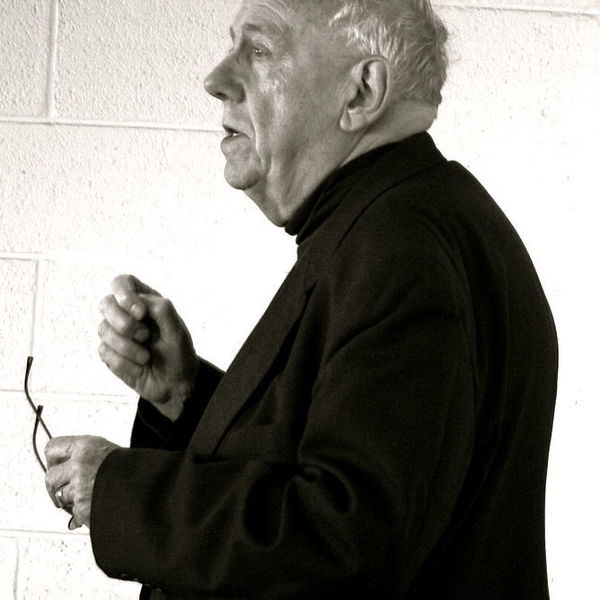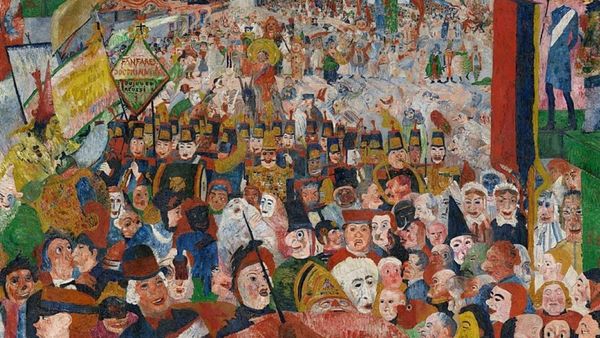According to Marx, religion has a dual role to play. Throughout the history of class society religion performs two essential functions: it buttresses the established order by sanctifying it and by suggesting that the political order is somehow ordained by divine authority, and it consoles the oppressed and exploited by offering them in heaven what they are denied upon earth. At the same time, by holding before them a vision of what they are denied, religion plays at least partly a progressive role in that it gives the common people some idea of what a better order would be. But when it becomes possible to realize that better order upon earth in the form of communism, then religion becomes wholly reactionary, for it distracts men from establishing a now possible good society on earth by still turning their eyes toward heaven. Its sanctification of the existing social order makes it a counter-revolutionary force. Thus in the course of building a communist society, the Marxist must fight religion because it will inevitably stand in his path. But in a communist society there will be no need to persecute religion, for its essential functions will have disappeared. There will no longer be an exploiting class, nor will the common people stand in need of religious consolations. Religion itself will disappear of its own accord without persecution. (This is an interesting example of the functionalism embodied in Marxism; the state, too, according to Marx and Lenin, will wither away when it becomes functionless.)
In origin, nevertheless, religion may be genuinely revolutionary, a real attempt to abolish exploitation. It only becomes other-worldly when its attempts to transform this world fail. Then its hope of the good society is transferred to another world, and in ideal form compensates for man's powerlessness to realize his ideal. Engels saw Christianity as having undergone this change.
The history of early Christianity has many characteristic points of contact with the present labor movement. Like the latter, Christianity was at first a movement of the oppressed; it began as a religion of the slaves and the freed, the poor and outlawed, of the peoples defeated and crushed by the force of Rome. Both Christianity and Proletarian Socialism preached the coming deliverance from slavery and poverty (On the History of Early Christianity, I).
Engels goes on to say that whereas socialism puts this deliverance on earth, Christianity puts it in heaven. Kautsky, however, in The Foundations of Christianity, was prepared to go further. "The liberation from poverty which Christianity declared was at first thought of quite realistically. It was to take place in the world and not in Heaven." The transference of liberation to heaven only took place later.
Thus the essential mark of latter-day religion [according to Marxism] is its other-worldliness. It places far off the salvation that socialism brings near. It has its origin in man's sense of his powerlessness in this world. Engels continually emphasizes man's feeling of powerlessness before nature in speaking of the origins of primitive religion. But it is not only before nature that man is powerless; he is also overwhelmed by society, so that the processes of society appear to man as strange and terrible divinities. Thus in ancient Greek religion the power of necessity, ananke, was personified. The Marxist scholar George Thomson writes in Aeschylus and Athens that:
Throughout Greek literature, from Homer onwards, the ideas of ananke, "necessity," and douleia, "slavery," are intimately connected, the former being habitually employed to denote both the state of slavery as such and the hard labors and tortures to which slaves are subjected. . . . During the maturity of the city-state the idea of ananke was developed and extended. Not only was the slave under the absolute control of his master and denied all share in the surplus product of his labor, but the master himself, in the conditions of a monetary economy, was at the mercy of forces which he was unable to control; and so the freeman, too, was enslaved to the blind force of necessity, which frustrated his desires and defeated his efforts. But if necessity is supreme, and her action incalculable, all change appears subjectively as chance; and so by the side of ananke there arose the figure of tyche—opposite poles of the same conception. The belief that the world is ruled by tyche can be traced through Euripides to Pindar, who declared that she was one of the moirai and the strongest of them all; and during the next two centuries, the cult of tyche became one of the most widespread and popular in Greece.
This passage is characteristic of the Marxist contention that the gods are personifications of the powers that dominate human life. When such powers no longer dominate man, there will no longer be gods.
This is how Marxism hopes to abolish religion. But there remains the initial assumption that religion needs to be accounted for. Marxism seems to assume from the outset that religion is palpably false. How is it able to do so?
The answer to this lies in Marx's materialism. Since matter is the primary reality, the possibility of the existence of a god or of gods is excluded. This leads to two questions: What is involved in Marx's materialism? And in what sort of a god is belief excluded by materialism? Marx inherited his materialism from Feuerbach; but all Feuerbach had said was that being precedes consciousness, not consciousness being. This assertion is one that could be made by many religious believers. The question is always one of the nature of being, not of its priority. By "being" Marx and Feuerbach both mean "all that is" and the assertion of the primacy of being becomes materialism only because of the additional belief that everything that is, is a more or less complicated organization of atoms. Engels uses the formula "matter in motion" to cover this. Since everything is explicable ultimately in terms of matter in motion, religious explanations of any event are excluded. This at once brings us to the answer to our second question. Religion is conceived by the Marxist as offering explanations of phenomena which are alternatives to scientific explanation. Science explains in terms of a this-worldly causation, religion in terms of an other-worldly causation. Thus religion is only disposed of by the Marxist critique if it is true that the essential character of religion is other-worldliness, its essential claim to explain phenomena, and its essential function to compensate for human powerlessness and to mask human exploitation. This thesis we must now examine.
It must be granted that the Marxist critique holds true for a great deal of religion, and in particular for a great deal of nineteenth-century religion. The doctrine of the Tractarians, for example, helps to illustrate the critique. Suspiciously enough, the doctrines of priesthood and of apostolic succession were rediscovered by Anglicans just at the time when the state was beginning to deny in its practice any real difference between nonconformity and the Church of England. High churchmanship replaced social eminence as the mark of the staunch Anglican. The ascetic disciplines which the Tractarians commended were of a kind possible only to a leisured class; their sacramental doctrines were irrelevant in an industrial society. F. D. Maurice wrote of their view of baptism in 1838:
Where is the minister of Christ in London, Birmingham or Manchester, whom such a doctrine, heartily and inwardly entertained, would not drive to madness? He is sent to preach the Gospel. What Gospel? Of all the thousands whom he addresses, he cannot venture to believe that there are ten who, in Dr. Pusey's sense, retain their baptismal purity. All he can do, therefore, is to tell wretched creatures, who spend eighteen hours out of the twenty-four in close factories and bitter toil, corrupting and being corrupted, that if they spend the remaining six in prayer—he need not add fasting—they may possibly be saved. How can we insult God and torment man with such mockery?
There was another side to the doctrine of the Tractarians; but of a great deal of what they and churchmen of every persuasion taught the Marxist critique was and remains true.
Yet if it is this side of the Marxist critique that has dominated Marxist attitudes to religion in practice at most times and places, there has also persisted within Marxism a quite different emphasis upon religion as not merely "the opiate of the people" and "the sigh of the oppressed creature," but also "the heart of a heartless world" (Contribution to The Critique of Hegel's Philosophy of Right). Nor is this surprising when one recalls yet another aspect of the predictive failures of Marxism. Marx viewed religion as having in the present and future—as contrasted to the past—a wholly reactionary role, because he assumed that a completely secular world-view could not but be adopted by the working class, let alone by progressive intellectuals. Both Marx and Engels took it for granted that the intellectual case against religion had been made by the materialists and the skeptics of the eighteenth century. Insofar as their arguments still failed to convince, it was because religion was not a matter of the intellect, but of social needs. If the social factors which produced these needs were removed by transforming the structure of society, then religion would become functionless and would wither away. Indeed, Marx and Engels believed this to be already happening. They regarded the English as peculiarly backward, but Engels, who chided the English for their insular attachment to religion, believed that by the I85o's continental influences of a skeptical and atheistic kind were moving even the respectable middle classes. Skepticism, a he put it, had come in with salad oil. The English working class Engels regarded as much further along the road toward complete secularization. Already in 1844 he had envisaged the victory of unbelief as all but accomplished. Yet in two important respects he was mistaken.
The first and less important concerns the actual history of secularization; it has been slower and less effective in England than Engels predicted. The Catholic Church, for example, in England as elsewhere, has retained the allegiance of some sections of the industrial working class. But more important is a second and quite different type of error. For secularization has not resulted in the working classes—or indeed any other social group as a group—acquiring a new and more rational set of beliefs about the nature of man and the world. Rather, men have been deprived of any over-all view and to this extent have been deprived of one possible source of understanding and of action. Thus, at least so far as advanced industrial societies are concerned, outside those societies where Marxism is propagated by the state, the conditions which are inimical to religion seem to be inimical to Marxism too. Apparent exceptions to this seem indeed to be only apparent. The nominal Marxist allegiance of a large section of the French working class, for example, is only the attenuated content of the old radical secularism in a new dress; and as French society develops technologically and technocratically, it too is eroded. In such a situation the adherents and sympathizers of Marxism have not unnaturally been more apt to note resemblances between Marxism and Christianity of just the kind with which I have been concerned. Insensitivity to them has on the whole been exhibited only by the hostile critics of Marxism. Marx and Engels long ago proclaimed Thomas Muntzer as a spiritual ancestor; and modern Marxists have written several sympathetic studies of millenarian religion. How odd, then, that the resemblances between revolutionary Marxism and such religions have been noted by some critics as a necessarily discrediting fact. The unsatisfactory character of such discussions is in part due to the unexamined liberal, secular assumptions of the critics. It is also, however, due in part to a failure to distinguish different features of the analogy between Marxism and Christianity.
Both Marxism and Christianity rescue individual lives from the insignificance of finitude (to use an Hegelian expression) by showing the individual that he has or can have some role in a world-historical drama. The dramatic metaphor is not unimportant here. Marx, in the Eighteenth Brumaire of Louis Bonaparte, saw the function of ideology in past revolutions as providing a dramatic framework which events themselves would otherwise have lacked. But the revolution of the nineteenth century was, in his words, to "draw its poetry from the future." No dramaturge, but history itself, is now needed. Christianity cannot dispense with the notion of men having parts in a cosmic drama. The liturgy is the reenactment of this notion. But if religion is able to create an identity that transcends the identity which the existing social order confers upon individuals and within which it would like to confine them (so that it is the message of reactionary religion that it is God himself who wishes to confine us "in that station" to which he has been pleased to call us), it is also true that the sacrifice of individuals for eternal purposes is inherent in religion, and both sides of this phenomenon are carried over into Marxism.
The process by which they are carried over cannot be understood apart from that whole regression of Marxism which I discussed earlier and which originated in the deification of the Party or of history or of both. This reemergence of ideal entities in the history of Marxism renders intelligible those surface phenomena of Marxism which are so obviously religious that it has become trite to remark upon them. The cultic preservation of Lenin's body is an outstanding example. Still obvious but of far greater significance is the treatment of deviations of belief. Clearly someone who has been a Marxist may alter his beliefs on some point in such a way that common action with his former comrades becomes impossible; but it has often been the case in Marxist movements that common assent is required to beliefs which do not involve immediate action or action in the foreseeable future, and as far as rival predictions are concerned, there has been little attempt by Marxists to agree on a way in which their differences might be settled and the outcome awaited. Creedal uniformity, as in religion, often seems to be valued by Marxists for its own sake. The disciplining of the Soviet economist Varga for his view of postwar Europe is the kind of case I have in mind. This example also underlines the fact that the failure of Marxism to free itself from its religious heritage has made it easier for Marxists to elaborate a concept of science quite other than that of Marx and Engels. Both of them had the kind of interest in the progress of science not uncharacteristic of their age. Engels' own writings on science are of extremely dubious value. But it is fair to say that he accepted natural science as a continuing activity with its own standards and methods. The notion that there could be a peculiarly Marxist science as opposed to "bourgeois science" is alien to his thought. The roots of this Stalinist notion lie in the religious concept of beliefs about the world not having to derive their validity from the observed facts. Lysenko's fraudulent experiments are the counterpart to those fraudulent cases of miraculous weeping or bleeding statues which the Bolsheviks at one time so delighted in exposing in their anti-God exhibitions.
But too much attention to these relatively surface phenomena may be misleading; they belong to the corruption of Marxism, and if Marxism is corruptible, this is, as Marxists themselves should have well understood, a possible fate of any doctrine that functions as the expression of social forces. Christians who make use of this kind of point in order to criticize Marxism as a whole ought to remember that it is precisely what Marxism has in common with Christianity that has rendered it so particularly vulnerable. Liberals who produce this kind of critique all too often wish to ignore the Marxist critique of liberalism. Both liberals and Christians are too apt to forget that Marxism is the only systematic doctrine in the modern world that has been able to translate to any important degree the hopes men once expressed, and could not but express in religious terms, into the secular project of understanding societies and expressions of human possibility and history as a means of liberating the present from the burdens of the past, and so constructing the future. Liberalism, by contrast, simply abandons the virtue of hope. For liberals the future has become the present enlarged. Christianity remains irremediably tied to a social content it ought to disown. Marxism as historically embodied phenomenon may have been deformed in a large variety of ways. But the Marxist project remains the only one we have for reestablishing hope as a social virtue.
Editorial Statement: This excerpt of Chapter 7 from Alasdair MacIntyre's early book (originally published in 1968, many years before he converted to Catholicism), Marxism and Christianity, is part of an ongoing collaboration with the University of Notre Dame Press.


